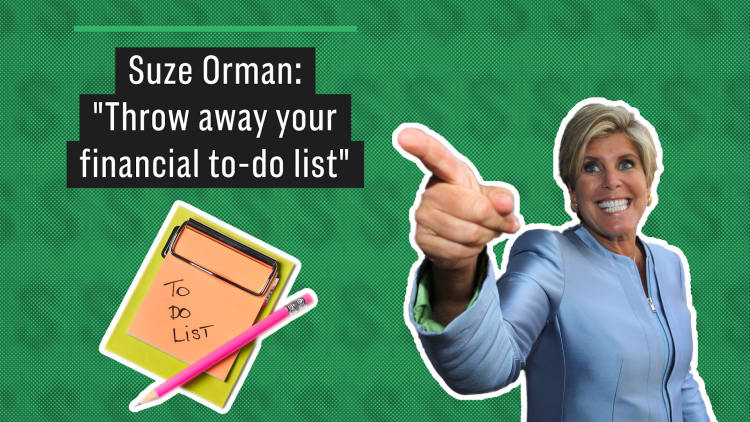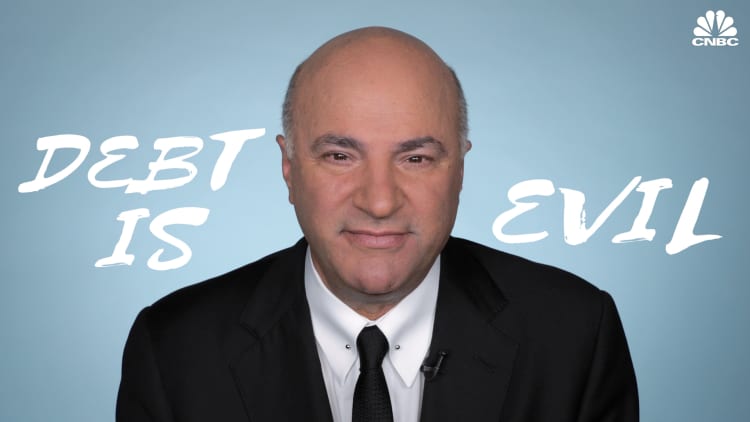Half of Americans feel anxious about their debt. And no wonder — U.S. adults have racked up an average of $28,900 in personal debt, excluding mortgages.
That's according to Northwestern Mutual's 2019 Planning & Progress Study, which used The Harris Poll to survey over 2,000 U.S. adults about their finances. While that's a staggering amount of debt, it's actually lower than the average of $38,000 respondents reported in last year's survey.
A leading source of that debt is credit card bills. The biggest portion of Americans, 40%, feel that they will pay everything off within five years. But a third estimate it will take anywhere from six to 20 years to pay off their debt, and 15% say they will be paying off credit card bills for the rest of their life.
How to start tackling debt today
The first step toward making headway on your debt: Take inventory. A full 34% of Americans don't know how much of their monthly income is going toward debt, Northwestern Mutual's survey found. Nearly one in five Americans don't know what the interest rates on their credit cards are, and another 31% have balances on cards with APRs of 15% or higher.
"The best course of action is to get a handle on where you are today and then come up with a plan to tackle the debt," Barbara Ginty, a certified financial planner and host of the "Future Rich" podcast, tells CNBC Make It. For many struggling with debt, the hardest part is acknowledging it and facing it head-on.
"A lot of people ignore it, which only makes it worse," Ginty says. Instead, learn what the balances and interest rates are for your outstanding debts. Then come up with a plan to pay them down and set up a budget that works with your strategy.
You can use either the so-called "avalanche method," where you start by paying off the debt with the highest interest rate, or the "snowball method," where you start with the smallest balance, pay it off, and then work your way toward tackling the biggest debts. For many, it helps to "break it down into smaller action steps so that it doesn't feel so daunting," Ginty says. For example, tackling one card at a time if you have multiple cards.
When possible, in may also be worth checking to see if you can apply for a balance transfer with a credit card offering a 0% APR and use that as a strategy to help pay off your debt, Ginty says.
"This allows you to pay down the balance without interest," she explains. But be careful with this strategy, she says, because if you miss a payment or are late, the credit card company can typically charge you a penalty APR. To help avoid that, set up autopay.
Ted Rossman, card industry analyst at CreditCards.com, regularly recommends Amex Everyday, Chase Slate and BankAmericard, which all have a $0 balance transfer fee and offer 0% APR for 15 months. Ordinarily, balance transfer cards charge a fee of 3% to 5%.

Don't forget that even though you're paying down debt, you should also put some money aside in savings each month, if possible. Having a savings cushion will help you out in an emergency, such as a car or home repair, so you don't end up adding more money to your credit card balance.
The standard rule of thumb is to have three to six months' worth of expenses in a savings account in case of an emergency, Michael Kelley, a certified financial planner and founder of Cleveland-based Michael Kelley Financial Planning, tells CNBC Make It. But if your career or profession is "more susceptible to layoffs and changes in the economy," Kelley says that it's worth increasing that savings goal to a year's worth of expenses.
Where you keep the money matters too: "This emergency savings account should be held wherever the client can receive the best yield while still being protected by the FDIC," Kelley adds, pointing out that online banks like VIO and Marcus are currently paying 2% or more in interest.
No matter which strategy you choose to eliminate debt, creating a plan and executing it will hopefully alleviate some financial stress since you're taking control of the situation, Ginty says.
Don't miss: Andrew Yang is offering 10 people $1,000 a month—here's how average Americans would spend the money
Like this story? Subscribe to CNBC Make It on YouTube!



